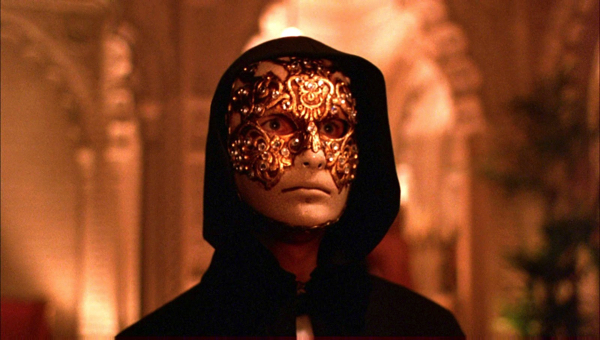




Dir: Stanley Kubrick | Wri: Frederic Raphael, Stanley Kubrick | Cast: Nicole Kidman, Tom Cruise, Sydney Pollack, Todd Field | US Thriller 159′
Stanley Kubrick’s last film is ironically his biggest disappointment. Eyes Wide Shut looks alluring and the starry cast is impressive, but the story just doesn’t lead where you hope it will: it doesn’t lead you anywhere for that matter – unless of course you want to be transported to a surreal dreamworld of ludicrous nightmares where the doom-laden sensuality is more important than the message it actually delivers. The last act of this Gothic Manhattan thriller is completely out of context with what has gone before.
Crucially, this fantasy thriller is built around two cypher-like central characters who are merely there to serve the premise that marriage is first and foremost a affair built on fidelity. And any transgression from either side leads to the relationship imploding rather than being strengthened by its changed dynamic. If you lop a branch off a tree, the tree doesn’t necessarily die, it just grows in a different direction, and can even flourish from a little light pruning – and this what could have happened if we buy into the story that Kubrick tells, based on Arthur Schnitzler’s original Viennese novel Traumnovelle (he also wrote La Ronde).
We first meet Dr Bill Harford (Cruise) and his glib wife Alice (a sizzling Nicole Kidman) dressing seductively for a cocktail party given by an illustrious patient of a close friend, Dr Victor Ziegler (Pollack). Cruise and Kidman adopt the same mannered style of acting as Jack Nicholson (Torrance) in The Shining, and this all adds a touch of droll humour to the otherwise rather sinister tone.
Bill and Alice are confident, and secure in their marriage to each other as parents of a 7 year old daughter. Being 1990s America, marital infidelity is still treated very seriously. After flirting outrageously during the evening, the two of them go home and spend a few minutes smoking a joint and fondling one another in bed while projecting their sexual fantasies onto each other: Alice is outspoken in her belief that women are just as sexually promiscuous as men, given the opportunity. And what she says is convincing: if a person is suddenly consumed with desire for a stranger they will do absolutely anything to consummate that urge, even if it involves cheating on their existing partner, who ironically attains a status of enhanced endearment and affection in their hearts – while their brain is almost locked in an atavistic need to mate, whatever the cost. Alice describes an incident where, in her early marriage, she’d locked eyes on a certain naval officer in a hotel lobby, they’d exchanged lascivious glances and she became obsessed with pursuing the man, expressing her profound relief to discover he’d left the building.
Thus Kubrick sets the stage for all kinds of possibilities to play out in the rest of the film having set the seed of doubt in the doctor’s mind, but not in that of his wife, who clearly trusts him implicitly
Eyes Wide Shut certainly showcases Kubrick’s mastery as a filmmaker. According to his daughter Anya it was his favourite film and it positively glows with the rich and sensuous warmth of New York in the holiday season, both in the shimmering streets and the vibrant interiors. But a weird nagging doubt hangs over proceedings. And this doubt eats into the doctor, unleashing all kinds of ideas about his wife Alice who he imagines being seduced by the man, that same naval officer, in her fantasy projection. Dr Bill even succumbs to the charms of a passing prostitute but is saved from actually going through with it when a call from Alice stops him in his tracks. And as the evening wears on he lets his sexual imagination wander on meeting an old school friend who talks about a late-night gig in an upmarket porno club. Fuelled by Alice’s revelations he decides to join his friend in sampling this evening of erotica.